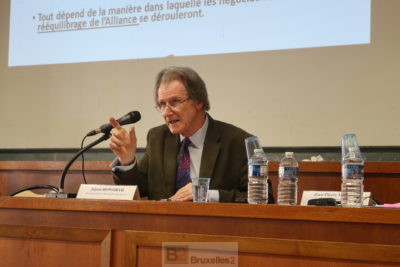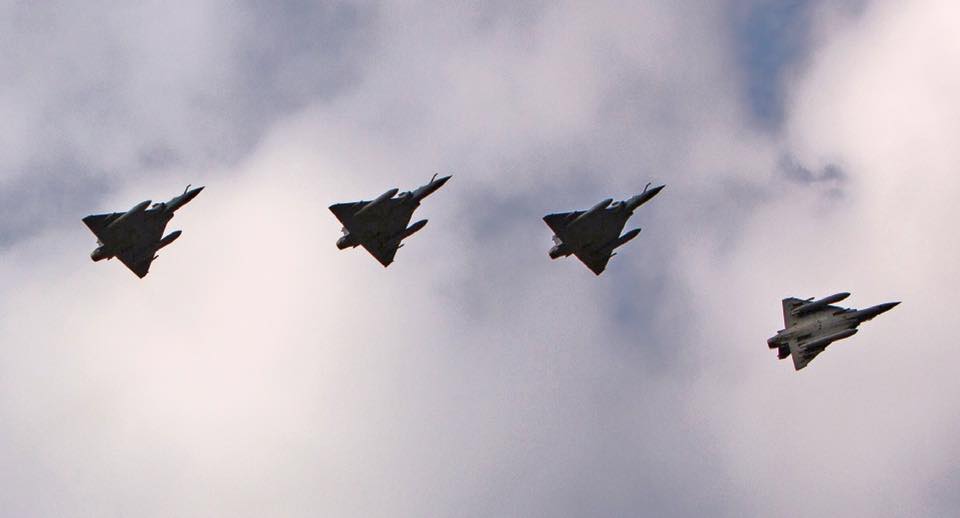Interviews. A 'grand strategy' for Europe (J. Howorth)
(B2) The European Union must reconsider its relationship with the United States and NATO to bring about a European defense strategy. This was defended by Jolyon Howorth, professor emeritus at the Harvard Kennedy School, during the second European defense talks in Paris on Thursday (May 16)

Faced with the creation of a European army, three obstacles...
The Americans are worried about the consequences of a European defense for their leadership. The British play on ambivalence so as not to offend the United States. The Europeans are struggling to agree on the way forward. Three obstacles that made fail » the first two attempts to forge a European army, the European Defense Community (EDC) in the 1950s and the first version of defense policy (ESDP or European Security and Defense Policy) in the late 1990s early 2000, and which continue to hamper new initiatives.
The Americans agree on the principle of a European defense
The Americans, often criticized for the backwardness of European defense initiatives, were not always against the idea and did not not oppose on principle, on the contrary ". But a question torments them, that of " consequences for the leadership of the Alliance, and even for its future if a credible European defense were to be formed. Hence the ambivalence of the United States on this idea that Eisenhower nevertheless regarded in 1951 as one of the objectives of the Alliance, an idea legitimized by the multiple American injunctions to increase European defense budgets. This confused position is part of the existential debate that is the definition of the next " great strategy American “, explains Jolyon Howorth.
... but concerns remain over their leadership within the Alliance
After " forty years of undisputed leadership of the European allies ", the stream " liberal hegemon which has long defined US policy is being challenged by supporters of " offshore balancing ". Who advocate an American withdrawal to " a very limited number of strategic bases " and one " transfer to Europeans de primary responsibility for their own safety ". The question remains open as Donald Trump “ seems to be associated with it ", without " understand for a moment the deep meaning of this strategic debate ».
The British, resistant to any European integration
The British were themselves, much more refractory than the Americans to the project from the start ". And they will continue to slow down the progress of the Europeans towards strategic autonomy », making the Paris-Berlin axis « all the more urgent ". The British vision is that of European security built on a " keystone “: NATO. The Europeans being simply relegated to a role " complementary ". That is why " London has blocked any progress which could have led to a European army while still claiming with hue and cry " a " unconditional commitment to European security, according to the professor, himself British. Yet firmly supported by Winston Churchill from the start, European defense quickly worried across the Channel, with the United Kingdom anxious to “ preserve the partnership with the United States ". The country had, for example, refused the EDC as early as 1953, fearing that " the success of the European army does not lead to the American disengagement ».
Undecided and divided Europeans
But in the end, the Europeans are their own enemies. National divisions on how to build Europe persist and come together, " deeply, within political families ". But with the new geostrategic context, increasingly complex and multidimensional, “ the European Union can no longer afford the luxury of its internal divisions ". We need to rethink our strategy to move from the Europe of defense to the defense of Europe ". These divisions crystallize the opposition between " integrationism » advocated by Monnet and « intergovernmentalism », according to the Gaullian model. The common security and defense policy (CSDP) has, since Saint-Malo, and the Franco-British declaration of 1998, been developed within the framework of the latter, a model " increasingly questioned ". The latest developments in defense place us once again faced with the confrontation of these two contradictory methodologies ».
Three major challenges today
Defining a specific European strategy
We must develop a great strategy European style hammers Jolyon Howorth. One of the fundamental problems with the first version of the CSDP was its " lack of ambition " by " fear of offending " Americans. However, " the only worthwhile ambition for the European Union is to assume its own collective defense ". And therefore to stop thinking that it is impossible for Europe to defend itself without American support. And it needs " to be able to adapt to the new planetary situation ". " After Trump, there will be no going back to square one ».
At what price
« The European army will not be purchased from Tati's sales ". NATO member states have spent 264 billion on defense issues in 2018. If all countries had met the NATO target of 2% of GDP, this would have increased the sum of " nearly 102 billion ". But an autonomous European army could represent up to " an additional $467 billion recalls the academic, based on a recent study of the International Institute for Security Studies (IISS) which assumes an American withdrawal from Europe. A substantial commitment.
And with who ?
If many believe that the European army will be forged " outside of NATO, without the Americans, even against Jolyon Howorth is not convinced. A European army must not be built against the Americans, but " on good terms with them ". Because the Alliance is not going to dissolve anytime soon. And it can have a leading role when there is currently " eighty cooperation projects between NATO and the EU, and that the Americans continue to ask us to increase our efforts, to encourage us to assume strategic leadership in our neighborhood ". We should rather go back to the initial scenario: an alliance “ rebalanced » in which the Europeans « gradually taking the lion's share "and the Americans play" the role of facilitators ". To form an alliance that is not structured by dependence, even less by servitude ».
(Coline Traverson st.)
B2 is the media partner for the second interviews. The program of the day : The 2nd Defense Interviews. It's May 16. More articles follow...
Read also:
- Interviews. Berlin is changing its defense policy under pressure, almost reluctantly (C. Major)
- Interviews. Europe must think better about its defense (L. Gautier)
The EDC's missed opportunity. France stirs up the European Defense Community and then kills it


